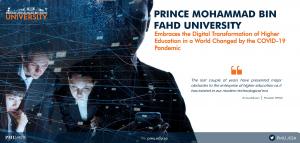Prince Mohammad Bin Fahd University Embraces the Digital Transformation of Higher Ed in a World Changed by the Pandemic
Reflecting the success of PMU's approach, the university ranked fourth among all universities in the Arab world in 2021
With school closures resulting in a massive shift to remote learning, students and educators alike have faced enormous new challenges—as well as opportunities. The higher education sector in particular has had to reform to serve great numbers of enrollees off-campus, while also preparing its matriculates for a newly modern workplace where far more daily duties are handled offsite via technological interfaces.
Amidst such upheaval in the education industry, Prince Mohammad Bin Fahd University (PMU) has agilely adapted and innovated to ensure that its student body of more than 18,000 enrollees has retained access to the best available resources and is equipped for the altered workplace of the present and future.
"The last couple of years have presented major obstacles to the enterprise of higher education as it has existed in our modern technological era," said Dr. Issa Al Ansari, President of PMU. "Yet by embracing the power of educational technology and skillfully adapting our pedagogy, we are continuing to meet our goal at PMU as a service provider of higher education by aligning with the latest practices and advancements."
Upgrading the higher education experience
This new era where administrators, faculty, and students engage some, most, or even all of the time in the enterprise of higher learning offsite through digital tools has required institutions to revamp their operations.
In this regard, the Information Technology (IT) Department at PMU has worked alongside the university's faculty and staff, as well as with the students themselves, in managing to effectively stay the academic course during the COVID-19 crisis.
Reflecting the success of PMU's approach, the university ranked fourth among all universities in the Arab world in 2021, according to the Times Higher Education (THE) World University Rankings. The excellence of PMU's institutional efforts further won the university a respectable ranking of 750 to 800 amongst the world's best universities, a recognition that jumps into the ranking of 101 to 150 among the world's youngest universities (those that have existed for less than 50 years), according to the QS World University Rankings, published annually by the United Kingdom-based higher-education company Quacquarelli Symonds.
Among the many initiatives, the IT Department pursued, its technicians proactively installed and upgraded the university information technology infrastructure in order to meet the needs of a suddenly large and long-term remote user community. Other efforts involved rolling out digital tools such as Blackboard Ultra, an online teaching application, and Microsoft Teams, a web-conferencing program, and assisting educators and students in how to use them. PMU's technicians also made virtual private networks (VPNs) available to remote users to grant them access to vital on-campus licensed software.
"Our staff responded admirably to the COVID-19 pandemic by ensuring that both faculty and students have been able to continue their academic journey together," said Dr. Al Ansari.
Reading today's and tomorrow's workforce
On account of the swift digital transformation demanded over the last two years, successful institutions of higher education have come to operationally resemble the modern pandemic-affected workplace. By keeping pace with top institutions around the world, PMU is also preparing its scholars for life after graduation.
By embracing digitally enhanced educational instruction and interactions, the PMU faculty have likewise adapted their teaching methods for all-remote and, when pandemic conditions have allowed, hybrid environments involving a mix of in-person and offsite learning.
"The comprehensive adjustments made at all levels of PMU to accommodate the exigencies of the COVID-19 pandemic, in moving from place-based learning on campus to learning virtually anywhere off-campus, have successfully helped us navigate these challenging times," said Dr. Al Ansari. "In the process, PMU has also equipped our students with cutting-edge digital knowledge and key skills that will serve them well over the course of their careers."
Moving forward, PMU and other institutions of higher education are looking to streamline operations and innovate further. One example is the continuing move toward a "cloud-first approach," whereby software systems and data are distributed across secure offsite data centers. These integrated systems and data are accordingly accessible to authorized users anywhere on personal devices, and not confined to certain machines or storage devices found only at particular locations on campus. Faculty and students can thus get what they need when they need it, vastly increasing efficiency and ultimately capability.
Also looking ahead, institutions of higher education are seeking to utilize so-called low-code and no-code software solutions. Instead of technical staff having to intensively engage in time-consuming and thus expensive coding implementation when deploying new systems, low- and no-code solutions enable rapid drag-and-drop-style deployment to deliver valuable IT services.
In these and other matters, PMU has embraced the accelerated digital transformation of higher education, which will lead to lasting change in the post-pandemic era.
"The pandemic has changed the world, and we at PMU have changed in response both pedagogically and technologically," said Dr. Al Ansari. "We are doing our part to help usher in a bright future for our global society."
Ankit S. Bhosale
Prince Mohammad Bin Fahd University
+966 54 658 6494
abhosale@pmu.edu.sa
Visit us on social media:
Twitter
LinkedIn
Other
Prince Mohammad bin Fahd University Review 2021
Legal Disclaimer:
EIN Presswire provides this news content "as is" without warranty of any kind. We do not accept any responsibility or liability for the accuracy, content, images, videos, licenses, completeness, legality, or reliability of the information contained in this article. If you have any complaints or copyright issues related to this article, kindly contact the author above.


